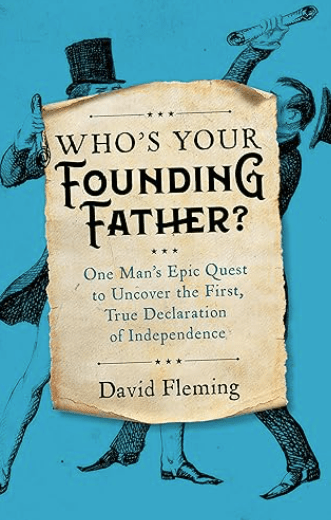
by David Fleming
Published by Hachette Books (May 16, 2023), Hardcover – $29, 320 pages
Hardback edition
Kindle Edition
Audible Edition
Reviewed by Erik Nelson
BOOKS
The Mecklenburg Declaration of Independence was signed on May 20, 1775, in Charlotte, North Carolina, more than a year before July 4, 1776. Whaaat?
Thomas Jefferson’s tombstone states he was the author of the Declaration of Independence, so what about those North Carolinians? Anyone familiar with the Outlander series has followed a little-known rebellion by a group of Scots-Irish settlers against Governor William Tryon over land and taxes.
British regulars fought armed colonials, well before the shot heard ‘round the world at Lexington. Fed up with egregiously poor colonial administration, a group of prominent men met in Charlotte, in May 1775, and formally declared their independence from British rule.
The Mecklenburg Declaration was a bold step, but the other colonies were not yet ready to go there. The North Carolina group sent four copies of their document to the Continental Congress, then meeting in Philadelphia. Three copies went to each of their colony’s delegates and the fourth to the president of that assembled body.
Just making that delivery entailed a harrowing 600-mile ride dodging British and Loyalist authorities.
In 1775, however, the Continental Congress still held out hope for reconciliation. A declaration of independence was premature, too radical to even discuss.
Consequently, the North Carolina document was not presented for debate and so never entered into record. There is no reference to it in the Continental Congress’ official documentation.
Relegated to obscurity from the onset, some scholars discount the Mecklenburg Declaration, while others claim it has been deliberately obscured, mostly to protect Jefferson’s stellar reputation. Astute readers will realize where that part of the story is going.
David Fleming, an investigative journalist, has brazenly stepped into this world of historic theory and counter-theory. Rather than producing yet another scholarly study that would get lost in a pile of other scholarly studies, he jumps into the discussion with a journalist’s flair for a good story. He understands the need for solid evidence, though, and his search for documentation takes him from construction zones near Charlotte (to find historic sites before they are obliterated by development) to the British Public Records Office (to read the correspondence of North Carolina’s colonial governor).
Questions about whether Jefferson had plagiarized the Mecklenburg Declaration were first raised by John Adams. The issue lingered as historians and localities claimed the glory of various aspects of the American Revolution. Washington slept in many places in New York, New Jersey, Pennsylvania, and elsewhere, but Virginia claimed authorship of the Declaration of Independence. But still there were those inconvenient North Carolinians.
The paper trail is the story. A fire in 1800 consumed the original Mecklenburg Declaration. There were copies, but those were routinely called into question. The full document had been published in its entirety in a Charlotte newspaper, but copies of that issue could not be found. The colonial governor of North Carolina, however, had included a copy with one of his reports to the home office. In the 1830s, an historian doing research for a biography of Thomas Jefferson wanted to address the Mecklenburg Declaration and asked his friend, the U.S. Minister to the United Kingdom, to check the British archives for him. Fleming checked that repository as well and details what he discovered (sorry, no spoiler here).
This is a rollicking good read that delves into a persistent historic controversy. An unimpeachable paper trail would make the case, but there are those who wanted that paper trail to disappear. These days prominent political figures write their own books, but back in the day doctoring the historic record was done more discreetly.





